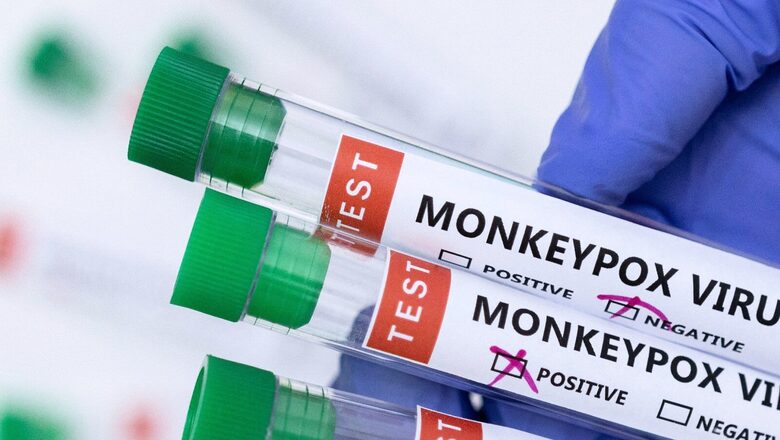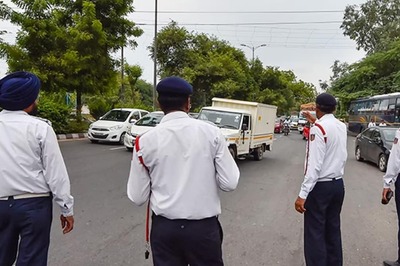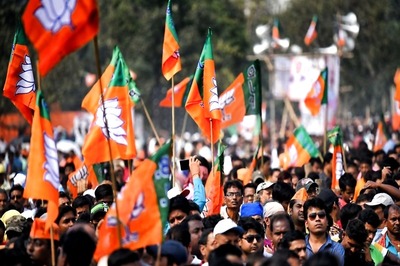
views
With the surge in monkeypox cases across the world and the WHO declaring it a global health emergency, concerns over the transmission of the virus from one person to another have also been raised. According to some experts, it spreads through close contact, including any sexual acts with a symptomatic partner. However, it is yet to be known if an asymptomatic person can transmit the virus or not. Health experts and researchers have urged people to remain vigilant and not treat the outbreak as a taboo.
Monkeypox is a viral zoonosis (a virus transmitted to humans from animals) with symptoms similar to those seen in the past in smallpox patients, although it is clinically less severe. There are two distinct genetic clades of the monkeypox virus – the Central African (Congo Basin) clade and West African. The Congo Basin clade has historically caused more severe disease and is thought to be more transmissible.
On being asked about whether monkeypox can be sexually transmitted, World Health Organization Director-General Tedros Adhanom Ghebreyesus, who announced on Saturday that the outbreak represents a global health emergency, said, “For the moment, this is an outbreak that’s concentrated among men who have sex with men, especially those with multiple sexual partners. That means, this is an outbreak that can be stopped with the right strategies in the right groups.”
Research published in the New England Journal of Medicine last week, which looked at 528 confirmed infections, showed 95 per cent of cases were transmitted through sexual activity and that 98 per cent of those infected were gay or bisexual men.
Speaking to news agency ANI, Dr Dhiren Gupta, a senior consultant at Delhi-based Sir Ganga Ram Hospital, said that the virus can be spread even through a prolonged face-to-face contact with an infected person. “This contact can happen during intimate contact including oral, anal and vaginal sex, or touching the genitals (penis, testicles, labia, and vagina) or anus (butthole) of a person with monkeypox. Hugging, massages and kissing as well as prolonged face-to-face contact could also lead to contraction of the virus,” he was quoted as saying.
He added that monkepox can also be transmitted through direct contact with body fluids or through contaminated clothing or linens of an infected person. Furthermore, the doctor said that having sexual contacts with multiple partners has the possibility to increase the chances of transmission of virus.
Dr Manoj Sharma, director and senior consultant at Delhi’s Fortis Hospital, told ANI that preventive methods such as a condom may not be effective in controlling the spread of virus.
Dr Poonam K Singh, Regional Director of WHO South-East Asia Region, told the news agency yesterday that it is majorly spreading through close physical and sexual contact. “The transmission of monkeypox appears to be occurring primarily through close physical contact, including sexual contact. Transmission can also occur from contaminated materials such as linens, bedding, electronics, and clothing that have infectious skin particles,” she said, adding, “We need to stay alert and be prepared to roll out an intense response to curtail the spread of monkeypox and while doing this, our efforts and measures should be sensitive, and devoid of stigma and discrimination.”
However, researchers have stressed that the monkeypox virus is not limited to sexual activity and can spread through close physical contact as well. “It is important to stress that monkeypox is not a sexually transmitted infection in the traditional sense; it can be acquired through any kind of close physical contact,” John Thornhill, one of the authors of the study, said in a statement.
Meanwhile, a WHO official said on Tuesday that the rapidly spreading monkeypox outbreak can be stopped. “We do at this moment still believe that this outbreak of monkeypox can be stopped with the right strategies in the right groups but time is going by and we all need to pull together to make that happen,” Rosamund Lewis, WHO Technical Lead on Monkeypox, told reporters.
Monkeypox is usually a self-limited disease with the symptoms lasting two to four weeks. The case fatality ratio has historically ranged from zero to 11 per cent in the general population and has been higher among young children. In recent times, the case fatality ratio has been around three to six per cent. Monkeypox typically presents itself with fever, headache, rashes for up to three weeks, sore throat, cough, and swollen lymph nodes.
The symptoms include lesions, which usually begin within one to three days of the onset of fever, last for around two to four weeks, and are often described as painful until the healing phase when they turn itchy (in the crust stage). A notable predilection for palm and soles is a characteristic of monkeypox.
This year, there have been more than 16,000 confirmed cases of monkeypox in more than 75 countries. Five deaths, all of which occurred in Africa, have been reported.
In India, there are four monkeypox cases as of now and the central government has taken proactive measures already. “Screening is being done at airports. Fifteen laboratories have been set up. The situation is under control and there is no need to panic,” said Dr VK Paul, Member (Health), Niti Aayog.
(with inputs from agencies)
Read all the Latest News and Breaking News here




















Comments
0 comment